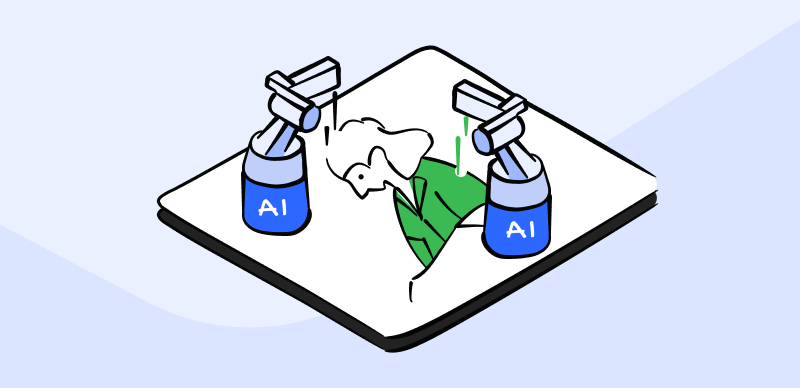Companies must be flexible and agile to stay ahead of the competition in today’s fast-paced technological environment. The inability of businesses in the past to organize their development and operations departments independently resulted in delays and errors and served as a barrier to work productivity. Contrarily, Devops has enabled organizations to seamlessly combine their development and operations teams, resulting in a more efficient and streamlined workflow. Automation is one of the most crucial elements of Devops.

Useful Devops Automation Tools
It aids in lowering the time and effort required for various tasks. Additionally, by implementing Devops automation tools, businesses can improve team collaboration, speed up the delivery of high-quality software, and boost overall efficiency. Numerous Devops automation tools are available, each with its advantages and disadvantages. The top 7 Devops automation tools, their advantages and disadvantages, and user reviews will all be covered in this article. Continue reading to learn about these useful tools for growing your business in the modern marketplace.
What Are DevOps Automation Tools?
Wondering what the fuss is all about? Look no further! Software programs known as Devops automation tools aid in automating the Devops approach’s software production, hosting, and operations procedures. Patrick Debois, a software developer from Belgium, created the idea of Devops in 2009. Numerous Devops automation tools are on the market, including configuration management, infrastructure automation, and continuous integration and delivery (CI/CD) tools.
With the help of these tools, businesses can automate the repetitive steps in the software production, hosting, and operations processes, giving Development and IT operations teams more time to concentrate on important tasks. Automating these processes allows businesses to develop and deploy software more quickly and effectively, which boosts customer satisfaction and trust in the company, which ultimately helps them build handsome revenue.
Why Are DevOps Automation Tools Important?
Do you want to know what makes Devops tools important? Look no further! IT is rapidly evolving and changing, with new technologies appearing daily. Their capacity to adopt the Devops methodology is one of the main factors contributing to the success of IT companies. Companies can streamline their software development, deployment, and operations processes by implementing Devops, resulting in shorter release cycles and higher-quality software. Besides this, some other factors are mentioned below:
Enhancing scalability and durability
Devops automation tools can enhance the scalability and durability of software systems. Organizations can scale their applications to meet increasing demand without worrying about the stability and reliability of their systems by automating the procedures involved in deploying, testing, and monitoring software. Besides this, automated testing tools enable organizations to find and address issues before they become significant, improving the software’s overall reliability.
Simplification and automation
The software development lifecycle can be streamlined and automated with the help of Devops automation tools. Software development follows several stages: design, coding, testing, and deployment. By automating these stages, organizations can utilize Devops automation tools to enhance efficiency, productivity, and quality. Besides this, it makes it possible for the development and operations teams to cooperate and communicate more. Better alignment between business objectives and technical requirements can result from this.
Making continuous delivery and deployment possible
Yet another potential benefit of Devops automation tools is supporting continuous delivery and deployment. Continuous delivery refers to automating the software delivery process to ensure that code changes are released promptly, securely, and consistently. It eases the process for developers to release new code updates at any time to live environments with the confidence that the code has undergone all required testing and quality checks.
Continuous deployment goes one step further by automatically deploying code changes into production environments. Every code change that completes the automated testing and quality assurance without entailing manual intervention is immediately deployed to production. Because new features and bug fixes can be distributed to users in real-time, this strategy enables businesses to respond to customer feedback and operational requirements quickly.
Top 7 Devops Automation Tools for Your Team
Many automation tools are on the market if you want to implement Devops in your company. Choosing the best one for your unique needs can be overwhelming. Due to this, we have listed the top 7 Devops automation tools along with a description of each one’s main characteristics. So let us get started and thoroughly examine these tools:
Jenkins
In the DevOps methodology, Jenkins, an open-source automation server, is frequently employed. Kohsuke Kawaguchi, a software engineer at Sun Microsystems, first developed it in 2004 under the name “Hudson.” Due to trademark issues, it was renamed “Jenkins” later. Software delivery quality and speed are increased thanks to Jenkins’ assistance in streamlining the software development and deployment process. It has eased the process of collaboration between the development and operations departments.
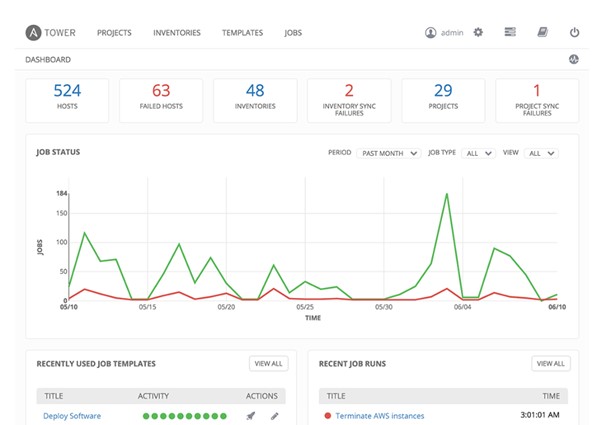
Devops Automation Tool – Ansible
Jenkins’s Top Features:
- Offers over 1500 plugins.
- Supports pipeline as code.
- Provides a customizable dashboard.
- Highly scalable.
What Jenkins’s Is Best For:
- Automation of Continuous integration and continuous delivery (CI/CD) pipeline.
- For integration with other tech stacks.
Customer Reviews:
- G2: 4.4/5 (449 reviews)
- Capterra: 4.5/5 (531 reviews)
Jenkins’s Price Plans:
- Free to use.
Ansible
Software provisioning, configuration management, and application deployment are all automated using the open-source tool Ansible. Michael DeHaan started it in 2012. Due to its ability to automate the deployment of software and infrastructure changes, Ansible is essential to the Devops methodology. Teams can deploy changes more quickly and accurately, which helps eliminate manual configuration processes and lowers the risk of errors.
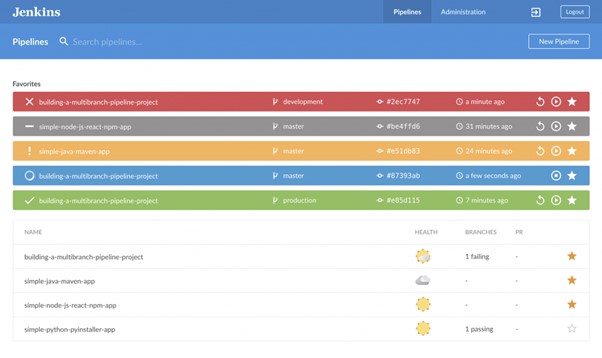
Devops Automation Tool – Jenkins
Ansible’s Top Features:
- Agentless architecture for managing nodes.
- Playbook-based automation.
- Ensure’s tasks are executed only once.
- Ability to delegate specific tasks to specific nodes.
What Ansible’s Is Best For:
- To manage complex infrastructure.
- Being highly flexible and customizable.
Customer Reviews:
- G2: 4.6/5 (112 reviews)
- Capterra: 4.4/5 (9 reviews)
Ansible’s Price Plans:
- Basic, Standard, and Premium Plans range from $4,000 – $15,000 /Annually
Puppet
Infrastructure deployment and management are automated by the open-source configuration management tool Puppet. Luke Kanies founded it in 2005 after realizing the demand for a tool to automate server configuration. By automating various software development, deployment, and operations processes, Puppet is a crucial tool in the Devops methodology and aids organizations in achieving their Devops objectives.
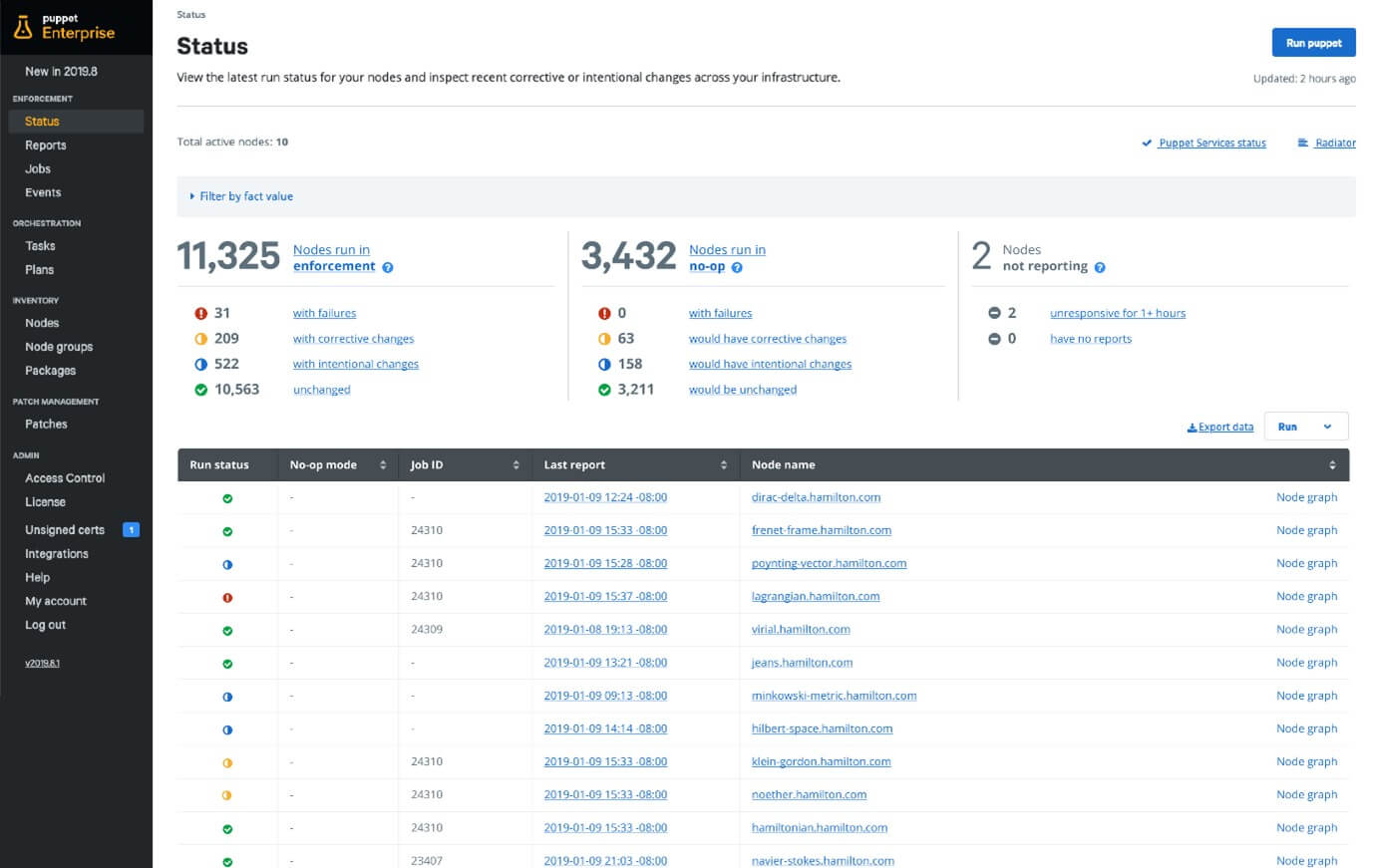
Devops Automation Tool – Puppet
Puppet’s Top Features:
- Brings Orchestration in automation.
- Uses declarative language.
- Abstracts the resources of a system.
- Integrate with external tools.
What Puppet’s Is Best For:
- Provides detailed reports and auditing.
- Managing large-scale infrastructure as code.
Customer Reviews:
- G2: 4.2/5 (37 reviews)
- Capterra: 4.4/5 (22 reviews)
Puppet’s Price Plans:
- Standard support plan @ $112 per node/year.
- Premium Plan @ $199 per node/year.
Chef
Chef is an open-source configuration management tool that automates infrastructure and application development, deployment, and management. Adam Jacob, a software engineer, and entrepreneur founded it in 2008. Chef is a handy Devops tool that assists organizations in managing their infrastructure as code and automating system configuration, deployment, and maintenance. It is used by businesses with smaller and larger customer bases without complaints.
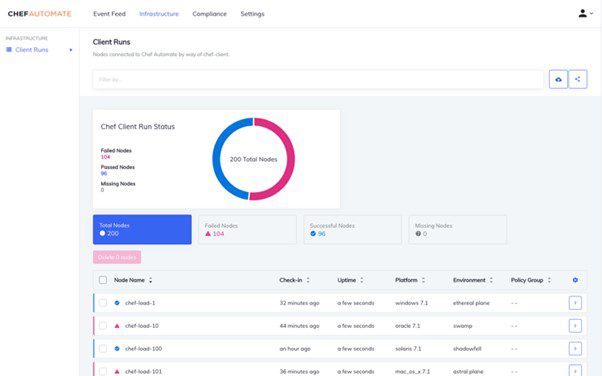
Devops Automation Tool – Chef
Chef’s Top Features:
- Uses a domain-specific language (DSL).
- Automate compliance checks.
- Provides APIs and configurations.
- Ability to Scale up/down accordingly.
What Chef’s Is Best For:
- Managing large-scale IT infrastructure.
- Managing heterogeneous environments.
Customer Reviews:
- G2: 4.2/5 (71 reviews)
- Capterra: 4.4/5 (34 reviews)
Chef’s Price Plans:
- Launch package@ $120/
- Standard package@ $300/month.
- Premium package@ $700/month.
Docker
In 2013, Solomon Hykes created the containerization platform known as Docker. It is a well-liked tool for software development, testing, and deployment in Devops. With the aid of Docker, programmers can package their applications with all necessary dependencies into a container that can be used on any device that supports Docker. As a result, developers will find it simpler to create, deploy, and manage applications consistently and effectively across various environments. Regardless of the underlying infrastructure, developers can create, ship, and run their applications anywhere using Docker.
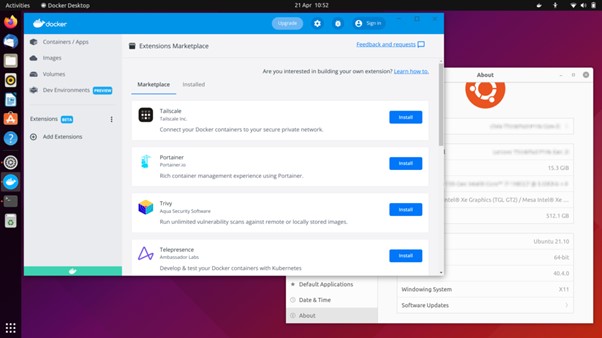
Devops Automation Tool – Docker
Docker’s Top Features:
- Provides portability.
- Provides built-in security features.
- Flexible and not infrastructure dependent.
- Speeds up execution.
What Docker’s Is Best For:
- For creating lightweight containers without stressing on packages and SDKs.
- Distribution and replication on multiple hosts.
Customer Reviews:
- G2: 4.6/5 (150 reviews)
- Capterra: 4.6/5 (474 reviews)
Docker’s Price Plans:
- Free plan.
- Pro @ $5/ Month.
- Team @ $9/ Month.
- Business @ $24/ Month.
Kubernetes
The open-source container orchestration platform Kubernetes, known as K8s, automates containerized applications’ deployment, scaling, and management. The Cloud Native Computing Foundation (CNCF) maintained it after Google developed it in 2014. By enabling teams to quickly deploy and manage containerized applications in a consistent and scalable manner, Kubernetes plays a crucial part in the Devops process. It enables teams to react quickly to shifting business requirements, reduces the risk of application downtime, and allows for efficient resource utilization.
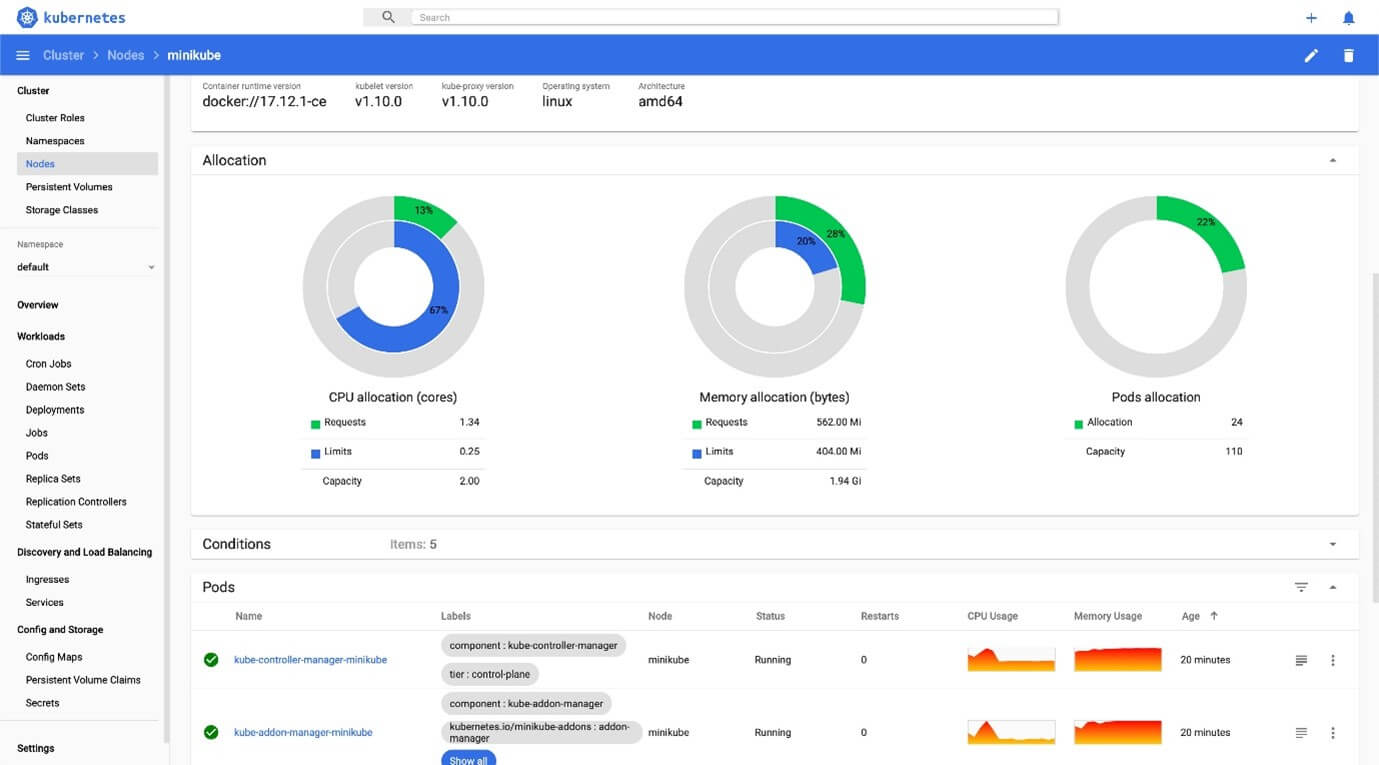
Devops Automation Tool – Kubernetes
Kubernetes’s Top Features:
- Cloud agnostic.
- Provides built-in monitoring tools.
- Supports rolling updates and rollbacks.
- Can detect and replace failed containers.
What Kubernetes’s Is Best For:
- Easy to manage and scalable platforms.
- Container orchestration.
Customer Reviews:
- G2: 4.6/5 (99 reviews)
- Capterra: 4.6/5 (32 reviews)
Kubernetes’s Price Plans:
- Basic Node @ $12/ per node.
- CPU optimized Node @ $42/ per node.
GitLab
A web-based Git repository management tool called GitLab enables developers to work together on code and control every stage of the Devops lifecycle. In 2011, Dmitriy Zaporozhets and Valery Sizov founded it. Due to its comprehensive set of continuous integration, delivery, and deployment features, GitLab has become a well-liked tool in the Devops community. It improves productivity, streamlines software development, and fosters effective teamwork.
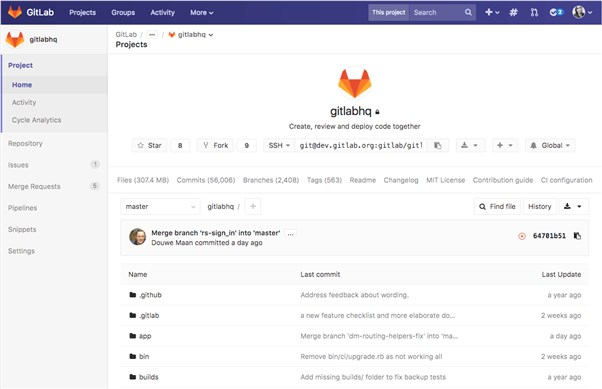
Devops Automation Tool – GitLab
GitLab’s Top Features:
- Range of security features.
- Variety of collaboration features.
- Built-in issue tracker.
- Allows managing git repositories.
What GitLab’s Is Best For:
- Integrated version control.
- CI/CD solution.
Customer Reviews:
- G2: 4.5/5 (693 reviews)
- Capterra: 4.6/5 (956 reviews)
GitLab’s Price Plans:
- Free plan.
- Premium @ $24/ Month.
- Ultimate @ $99/ Month.
Will DevOps be Replaced by AI?
Devops is unlikely to be completely replaced by AI soon. While AI can play a role in the Devops process, it is not a replacement for the human skills and expertise for successful Devops. While AI can automate certain tasks and increase efficiency, it cannot substitute the brainstorming capability, critical thinking, and problem-solving skills required in Devops. As a result, it is more likely that AI will be used to augment and enhance Devops rather than completely replace it.
Irreplaceable human expertise
Human professionals’ knowledge, skill, and experience are not replaced by artificial intelligence (AI), despite the latter’s capacity to automate some tasks and make predictions based on data. AI, for instance, can help doctors diagnose and treat patients, but it cannot take substitute years of education and training that doctors receive in the medical field. Similarly, AI can help automate testing and deployment processes in software development, but it cannot replace experienced developers’ knowledge and expertise in producing high-quality code.
Constant enhancement
Continuous improvement is a key component of Devops, achieved through feedback and iterative procedures. The ongoing feedback and communication necessary for Devop’s success cannot be replaced by AI, even though it can assist with automation and optimization. For instance, in a Devops environment, operations’ feedback on the software’s performance can be used to improve the code, which can then be deployed and run more efficiently. Although AI can assist in automating this process, it cannot replace ongoing feedback and communication.
In essence, although AI can enhance Devops by automating tasks, increasing effectiveness, and minimizing errs, it is crucial to acknowledge that AI cannot substitute human cooperation and proficiency in the DevOps methodology.
Final Thought
In conclusion, Devops automation tools are crucial to modern software development because they allow organizations to automate and streamline potent tasks, ultimately increasing their success and productivity. This article thoroughly highlighted 7 immaculate Devops automation tools, emphasizing their main features and other factors. Please share this article with your friends and coworkers if you find it useful. We value your opinions, so please share any you may have in the section below.


